The two most important factors when organizing an event are the quality of the event itself, and event registration software.
The event quality depends on your organizational skills, but how can you tell which event registration software is the best?
There are many to choose from and they all have their pros and cons, as well as different pricing options.
Below is a breakdown of the 8 best options to fit every company and every budget.
- 1. Regpack
- 2. Eventbrite
- 3. Whova
- 4. Wild Apricot
- 5. Xing Events
- 6. Splash
- 7. Bizzabo
- 8. EventCreate
- Conclusion
1. Regpack
Regpack is an online registration software that can be used for camp, event, trip, or course registration.
It has integrated payment processing, so event organizers can collect registrations and payments using the same software.
It’s the preferred choice of small businesses and NGOs.
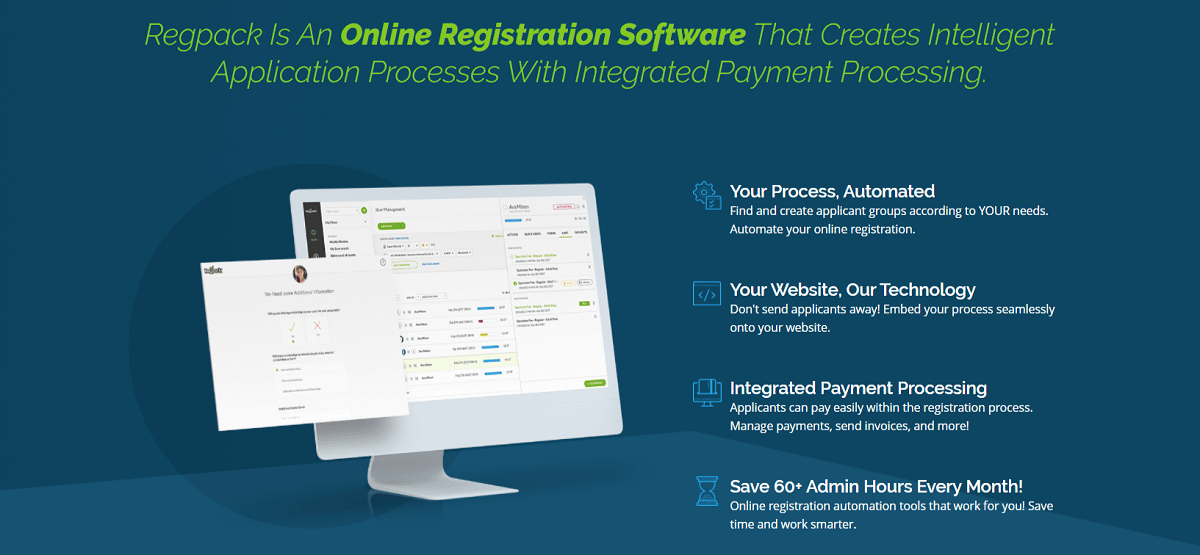
Source: Regpack
The best thing about Regpack is that it’s flexible and easy to use. It offers registration templates and forms that can streamline processes and help users save time.
It’s also optimized for mobile use, which is a necessity these days. Moreover, it allows group registrations and allows users to generate reports and guest lists in a few clicks.
The conditional logic approach used in the software makes it possible to create customized registration forms and offer a unique experience to each attendee, tailored to their specific profile.
Some users on G2 have reported that the interface could be a little more user-friendly, but this can be easily resolved by watching video tutorials or using Regpack’s 1-on-1 training option.
Regpack plans start at $125 per month per admin and there’s no limit to the number of users, reports, forms, or emails in each plan.
You also get a dedicated project manager to help you set things up and provide support as the event progresses. This is one of the basic requirements of project management for organizing events.
2. Eventbrite
Eventbrite is a popular event management and ticketing software that allows users to organize events and sell tickets for them.
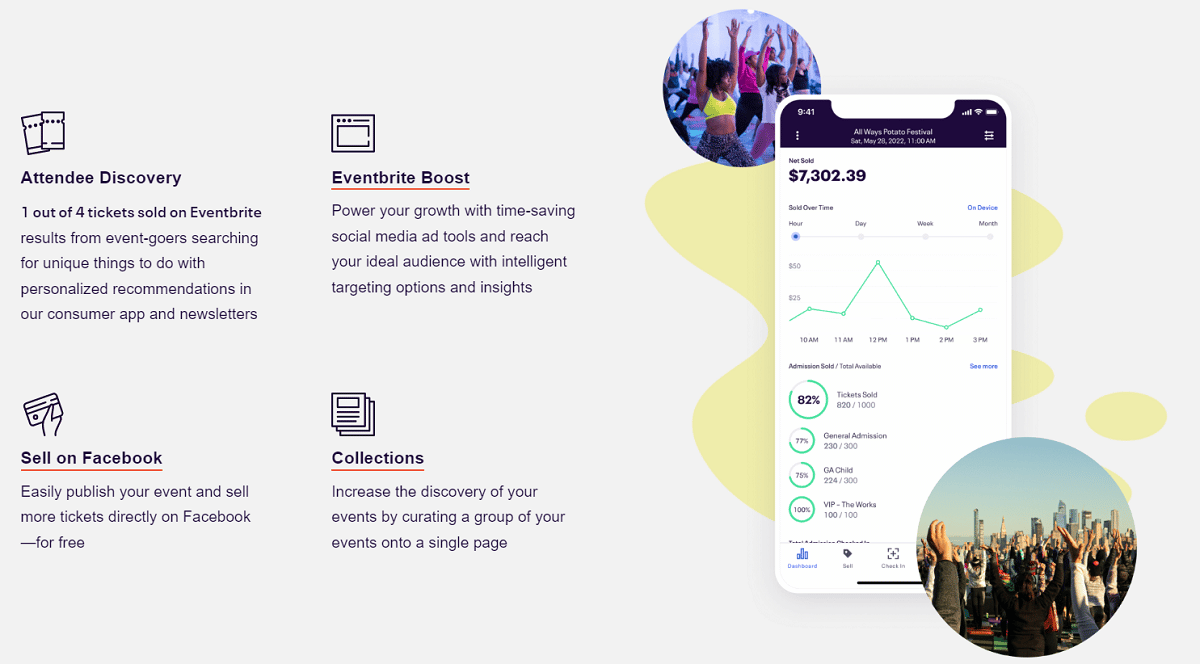
Source: Eventbrite
It can be used for charity events, business conferences, entertainment and social events, concerts, festivals, and more, both in-person and online.
Their homepage lets visitors browse events based on geographical area, category, or interests, increasing your event’s chances of being discovered by a relevant audience.
This is particularly useful for smaller businesses and non-profits because it expands their reach.
One of its top features is that users can promote their events on social media, which makes marketing easier. Furthermore, it’s versatile, so it can be used for almost any industry.
One of the biggest cons is that support is only available with premium packages and that there are no attendee engagement options.
Event organizers can select one of the three packages:
| Essentials | Fee per paid ticket: 2% + $0.79
Ticket types: 1 |
| Professional | Fee per paid ticket: 3.5% + $1.59
Ticket types: Unlimited |
| Premium | Fee per paid ticket: Custom
Ticket types: Unlimited |
A fee is charged for all ticketing services unless the event is free.
The fact that Eventbrite charges a percentage plus an additional fee per ticket means that some users might find it a bit costly, especially if there are many attendees (and therefore many tickets), or if the tickets aren’t cheap to begin with.
3. Whova
Whova is an event-management solution for in-person, hybrid, and virtual events. It can be used for corporate, academic, and association events, as well as conferences and festivals.
You can use it to make digital brochures, and design name badges and it can help with networking, as well as accelerate your event’s check-in process.
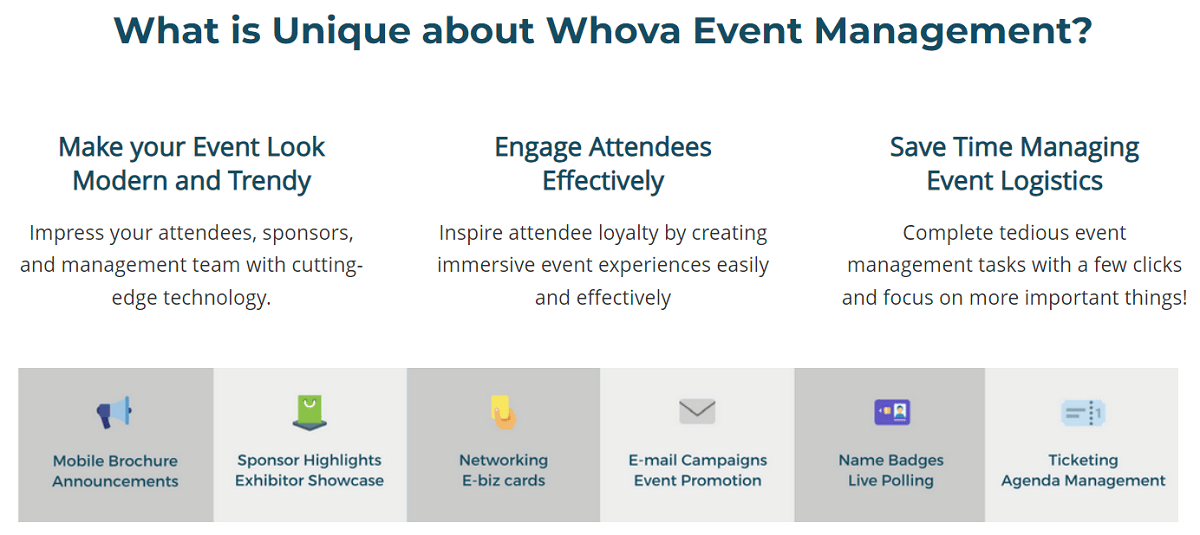
Source: Whova
Whova allows users to create different ticket types and manage them from a central location. Ticket sales can also be tracked to generate reports and see how well an event is doing.
The biggest advantage of Whova is the app users can download and use to check the agenda or network, while organizers can conduct promotional activities through it.
It also allows organizers to send instant notifications to attendees, which is convenient when there are changes.
On the other hand, the biggest disadvantage is the fact that Whova might not work well for small events.
As far as pricing goes, the software is free for free events, and then the fee charged per ticket if used in combination with Stripe is 2% + $0.99.
There’s also the option to let attendees absorb the cost by including it in their ticket price so you don’t actually pay anything extra, which is quite convenient.
For other options, you’ll need to contact them directly for a quote.
4. Wild Apricot
WildApricot is an event and membership management tool for non-profits, clubs, and associations—essentially, small to medium-sized associations.
It allows event organizers to create events quickly and the event conveniently appears on calendars on WildApricot’s and the user’s website, so attendees can register from either.
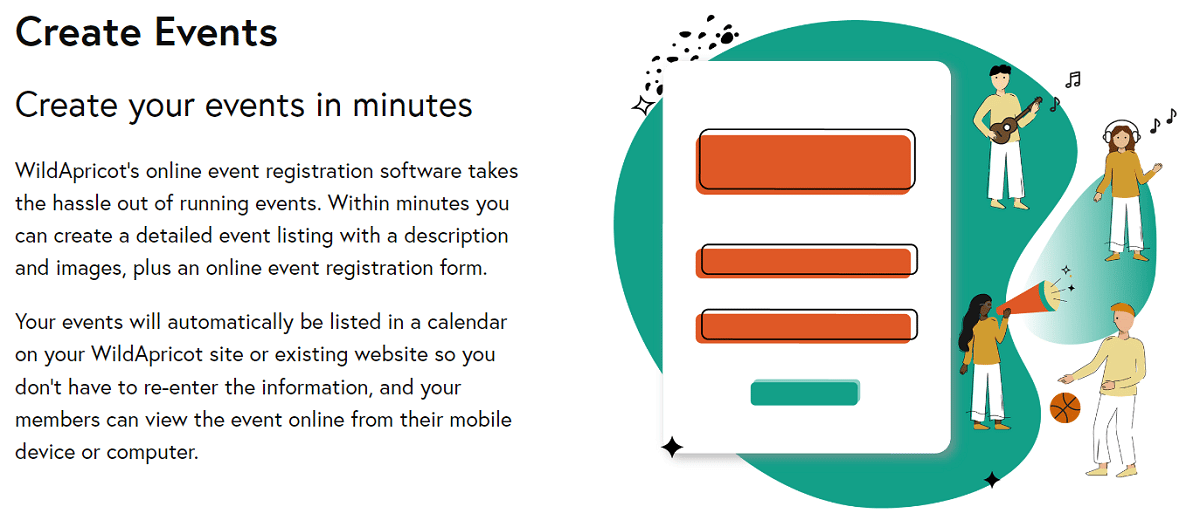
Source: WildApricot
Event organizers can make custom registration forms and send promotional emails in just a few clicks, as well as add discounts and send confirmation emails.
There’s also the option to create waitlists and guest registrations.
Similar to Whova, there’s an app, but there are two versions: for administrators and attendees.
The admin app enables admins to check in event attendees and update contact records, while the attendee app allows attendees to edit their profiles and register for events
That’s not the only thing it has in common with Whova. The two can actually be integrated to sync user information and create a seamless registration experience.
It works best for regular, recurring events that function on the principle of memberships.
There is a variety of pricing options, ranging from $48 to $420 per month, depending on the number of members.
| Plan | Price | Contacts |
| Free | Free (some exclusions apply) | 50 |
| Personal | $48/mo | 100 |
| Group | $60/mo | 250 |
| Community | $110/mo | 500 |
| Professional | $190/mo | 2,000 |
| Network | $350/mo | 5,000 |
| Enterprise | $420/mo | 15,000 |
This flexibility means that it can work for companies of various sizes.
5. Xing Events
Xing Events is attendee management and registration software, mainly used for conferences, trade fairs, and business networking.
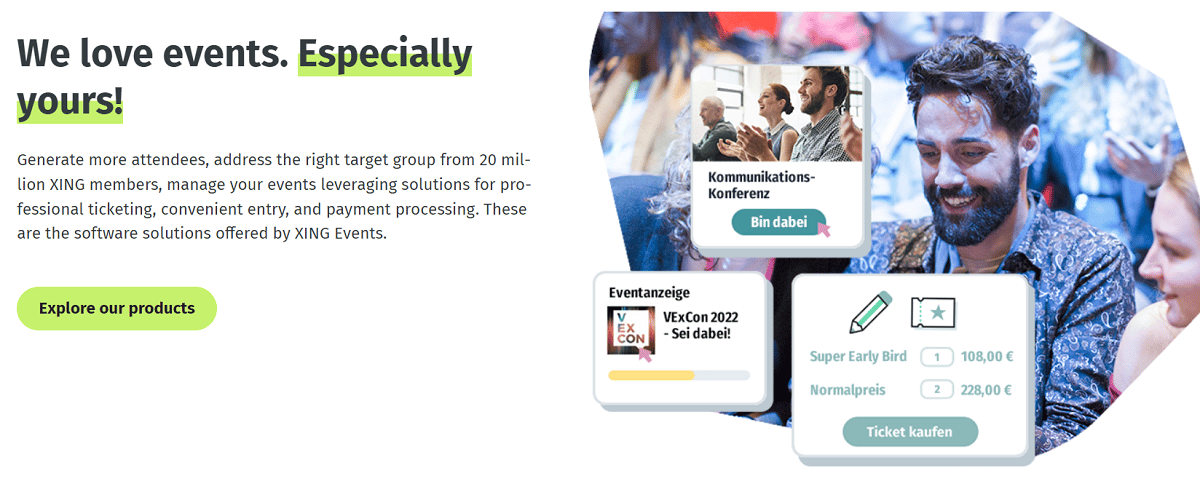
Source: Xing Events
It’s based in Germany, so it’s a good option for German-speaking events, but it can be used by professionals worldwide.
Xing Events can be used to create events quickly, promote them and reach specific target audiences by using powerful advertising tools.
It can also help with community building and drawing attention to your events in relevant groups, especially since it has a vast pool of 20 million users.
Attendee management can also be made easy with Xing Events as it can be used for creating and selling custom-made tickets in just a few steps.
It’s one of the best options for the European market and large-scale business events.
On the other hand, unlike many other solutions, it doesn’t allow attendees to network with each other, nor does it work for audience engagement.
The Basic plan is free for free events, while the Event Plus plan costs €39.95 per day and per event.
6. Splash
Splash is an event marketing platform that allows event organizers to launch and promote their events, such as concerts or corporate events.

Source: Splash
It can be used for designing marketing templates, checking in guests, and reporting.
The smart guest list option allows event organizers to build guest profiles and target the right audience.
It can easily be integrated with other platforms like Whova, Zapier, or Slack to sync and analyze data in real-time.
There’s even an option to track engagement, so, for instance, you can identify which of your guests has the biggest social influence and use this insight for marketing purposes.
It’s a great choice if you want to focus on marketing for your event.
However, some might consider it expensive as the plans start at $14,000 a year.
| Free | Free | For personal use and occasional small business events |
| Basic | Starting at $14,000 / year | For individuals and small teams |
| Pro | Starting at $23,000 / year | For more design and access control |
| Enterprise | Contact Splash for prices | For solutions and workflows at scale |
As it comes with such a hefty price tag, it might not be the best fit for smaller businesses.
7. Bizzabo
Bizzabo is described as an Event Experience Operating System on its website, promising to deliver more engaging and more human experiences to onsite, hybrid, and online events.
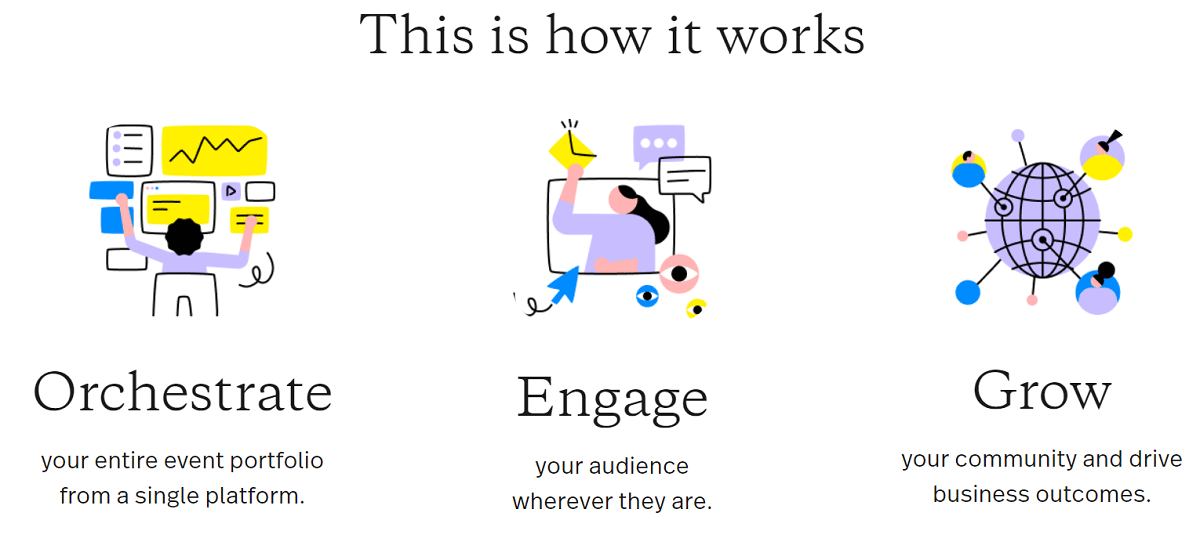
Source: Bizzabo
It’s suitable for a range of users, from corporations and non-profits to educational institutions and associations.
Event organizers can use it to manage events, and it can be integrated with popular platforms such as HubSpot or Salesforce to analyze data and turn it into marketing opportunities.
Furthermore, Bizzabo allows event organizers to use their registration forms on their websites, which is convenient for attendees as they can register directly on the event website.
Attendees appreciate this as they normally don’t like being redirected to third-party websites.
Chat, polls, surveys, Q&A, social sharing, and various other tools can be used to draw user attention and boost their engagement.
Registration forms can be customized to fit your brand, and you can add custom fields to them.
Bizzabo’s biggest advantage is that it’s a comprehensive solution that’s very simple to use for all kinds of events.
Their biggest disadvantage is the fact that there is no direct customer support line to call, so it can take a while for customer service to respond.
As events happen in real-time, this can be an issue.
As far as pricing goes, there’s no information on their website, so you’ll have to contact Bizzabo directly to get a quote.
8. EventCreate
EventCreate is an event website building platform that can be used for all types of events, from reunions and small get-togethers to large festivals.

Source: EventCreate
EventCreate allows users to create a website in a couple of minutes by choosing one of their many templates and then customizing it.
The event registration is built in, so everything can be managed directly from the website. Form questions can also be fully customized.
There’s an option to sell tickets, add discounts and even sell merchandise. Registrations can be tracked and reports created directly from the EventCreate dashboard.
The website for the event will be mobile-friendly, which is a big plus, and their mobile app can be used to scan tickets, which is also convenient.
Some users on GetApp have complained about high credit card transaction fees, and even though this is charged by their processor (Stripe), it’s not disclosed, so it might affect user experience.
The payment options differ based on whether you pay monthly or annually.
| Charged annually | Charged monthly | No. of events/attendees | |
| Basic | Free | Free | 1 event
100 attendees/event |
| Personal | $4/mo | $29/mo | 1 event
250 attendees/event |
| Personal+ | $8/mo | $49/mo | 3 events
1,000 attendees/event |
| Business/Agency | $24/mo | $119/mo | 10 events
2,500 attendees/event |
The price is significantly lower when charged annually, so this might be a good option to consider.
Conclusion
The choice of event registration software should not be taken lightly, so this overview of the 8 best software solutions was meant to guide your search for the best one.
By reviewing all options carefully and considering the pros and cons, you’ll find the one that best fits your business needs.


















